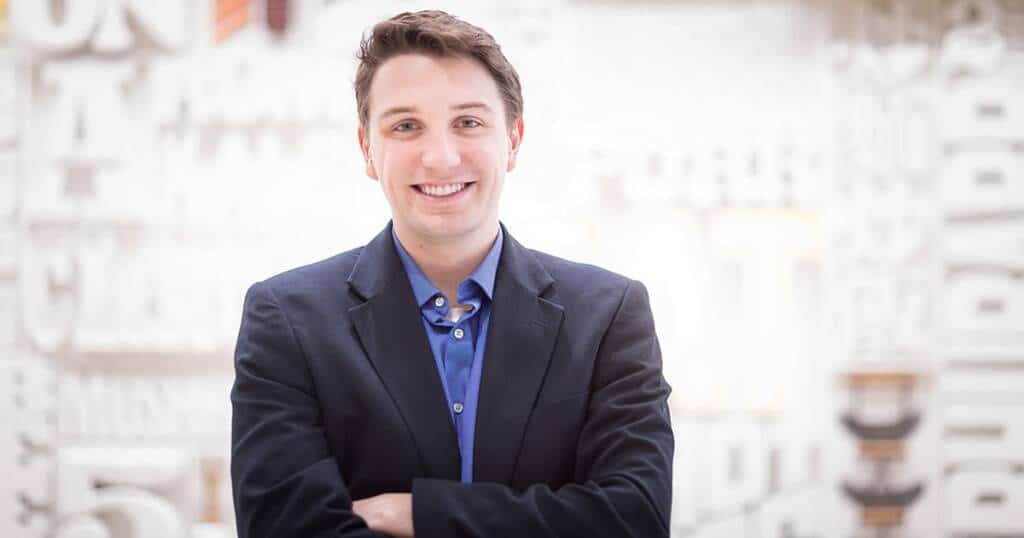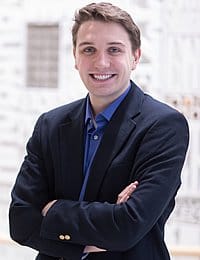
“It is absolutely possible to graduate from the CIA debt-free. You just have to stay organized, manage your time well, and stay motivated.”
CIA Student Bio
How did you become interested in food?
I grew up working in my parents’ restaurant in Virginia Beach, The Leaping Lizard Cafe, and competed in culinary competitions such as, C-CAP, FCCLA, and ProStart throughout high school. What really inspired me to pursue a career in the culinary arts were the strong role models in the kitchens I worked in throughout high school.
Why did you choose the CIA?
I had an amazing chef, Patrick Reed, at my Virginia Beach Tech Center who had graduated from the CIA and taught at the Johnson & Wales Richmond, VA campus for 13 years. When they closed the campus he became an instructor at my school. Having experienced both educational systems, he encouraged anyone serious about a career in food to attend The Culinary Institute of America.

—Carson Moreland, CIA Food Business Management student
How have scholarships and/or grants helped you reach your goal of getting a CIA education?
Scholarship and grant opportunities offered at the CIA are, in my opinion, among the most valuable resources available. In the past year I have applied to 49 internal scholarships, receiving 13. Through scholarship organizations and resources such as the $hef scholarship site, FCCLA, C-CAP, The James Beard Foundation, National Restaurant Association (NRA), and many others, I have raised around $98,000 for college and have not taken a loan out for school—and I only have one semester left! It is absolutely possible to graduate from the CIA debt-free. You just have to stay organized, manage your time well, and stay motivated.
What do you like best about the CIA?
What I like best about the CIA is that it provides students with the foundation and resources to thrive in whichever sector of the industry they choose to enter. The faculty is on your team and wants to see you succeed. I have worked with countless chefs—even chefs I never had for class—on recipe development and other projects. You can learn anything you want to learn here, as long as you are willing to seek out help and are motivated to improve.
Do you belong to any clubs or participate in any activities/sports on campus?
My second semester in the associate program I was an Associate Student Senator on the Student Government Board, as well as the secretary for the Slow Foods Club.
What is your favorite dish to make?
Growing up in Virginia Beach right on the Chesapeake Bay, nothing beats picking blue crabs on the beach with plenty of Old Bay, butter, and cold beer.
How has your CIA education prepared you for the business side of food?
The Intrapreneurship concentration within the Business Management degree is the best program for real-world training in running a foodservice operation. For anyone who seriously wants to own and operate a foodservice operation of any shape or size, resources within the program are reliable and will pay a lifetime of dividends. Not only do you learn how to build financial statements for your operation, but you physically get to operate the innovation kitchen and manage fiscal health of an operation in real time.
What are the best lessons you’ve learned while at the CIA?
First, always be 15 minutes early to everything. Second, don’t start anything if you’re not going to do it right the first time. Third, over-planning and over-communicating will help you effectively manage your resources. Last but not least, it’s just cooking—over-complicating the basics can take away from flavor and create unnecessary mistakes.
What are your career goals and how will your CIA education help you get there?
My goal is to work with chefs and other restaurants in Virginia Beach to encourage restaurant growth and culture within the region, while establishing opportunities for young culinarians in the area. I also plan to operate my parents’ fast-casual restaurant in Virginia Beach and establish multiple foodservice operations.
What advice would you give to a new student or someone who is considering attending the CIA?
Transfer in general-education course credits such as microeconomics, macroeconomics, English, and math. This will allow you space in your schedule to take classes in subjects that interest you more specifically such as mixology, personal finance, and brewing.
Carson Moreland is a CIA student pursuing his Bachelor’s Degree in Food Business Management at the college’s Hyde Park campus in New York. He is from Virginia Beach, VA.